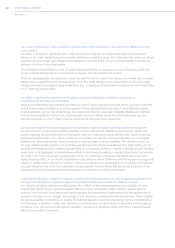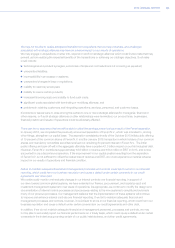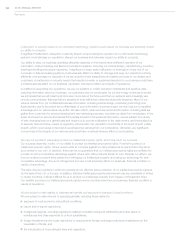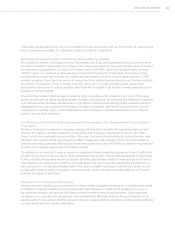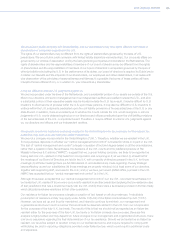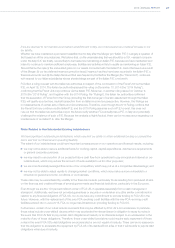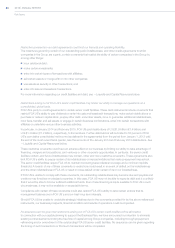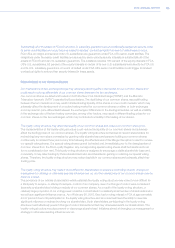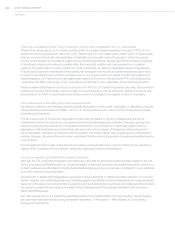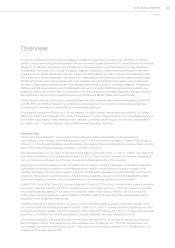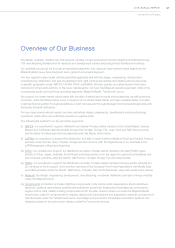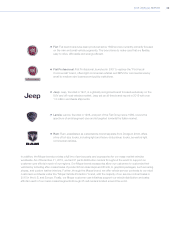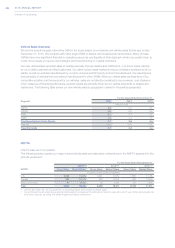Chrysler 2015 Annual Report Download - page 30
Download and view the complete annual report
Please find page 30 of the 2015 Chrysler annual report below. You can navigate through the pages in the report by either clicking on the pages listed below, or by using the keyword search tool below to find specific information within the annual report.
30 2015 | ANNUAL REPORT
Risk Factors
There may be potential Passive Foreign Investment Company tax considerations for U.S. Shareholders.
Shares of our stock held by a U.S. holder would be stock of a passive foreign investment company (“PFIC”) for U.S.
federal income tax purposes with respect to a U.S. Shareholder if for any taxable year in which such U.S. Shareholder
held our common shares, after the application of applicable look-through rules (i) 75 percent or more of our gross
income for the taxable year consists of passive income (including dividends, interest, gains from the sale or exchange
of investment property and rents and royalties other than rents and royalties which are received from unrelated
parties in connection with the active conduct of a trade or business, as defined in applicable Treasury Regulations),
or (ii) at least 50 percent of its assets for the taxable year (averaged over the year and determined based upon value)
produce or are held for the production of passive income. U.S. persons who own shares of a PFIC are subject to a
disadvantageous U.S. federal income tax regime with respect to the income derived by the PFIC, the dividends they
receive from the PFIC, and the gain, if any, they derive from the sale or other disposition of their shares in the PFIC.
While we believe that shares of our stock are not stock of a PFIC for U.S. federal income tax purposes, this conclusion
is based on a factual determination made annually and thus is subject to change. Moreover, shares of our stock may
become stock of a PFIC in future taxable years if there were to be changes in our assets, income or operations.
Tax consequences of the loyalty voting structure are uncertain.
No statutory, judicial or administrative authority directly discusses how the receipt, ownership, or disposition of special
voting shares should be treated for Italian, U.K. or U.S. tax purposes and as a result, the tax consequences in those
jurisdictions are uncertain.
The fair market value of our special voting shares, which may be relevant to the tax consequences, is a factual
determination and is not governed by any guidance that directly addresses such a situation. Because, among other
things, the special voting shares are not transferable (other than, in very limited circumstances, together with our
associated common shares) and a shareholder will receive amounts in respect of the special voting shares only if
we are liquidated, we believe and intend to take the position that the fair market value of each special voting share is
minimal. However, the relevant tax authorities could assert that the value of the special voting shares as determined by
us is incorrect.
The tax treatment of the loyalty voting structure is unclear and shareholders are urged to consult their tax advisors in
respect of the consequences of acquiring, owning and disposing of special voting shares.
Tax may be required to be withheld from dividend payments.
Although the U.K. and Dutch competent authorities have ruled that we should be treated as solely resident in the U.K.
for the purposes of the Netherlands-U.K. double tax treaty, under Dutch domestic law dividend payments made by us
to Dutch residents are still subject to Dutch dividend withholding tax and we would have no obligation to pay additional
amounts in respect of such payments.
Should Dutch or Italian withholding taxes be imposed on future dividends or distributions with respect to our common
shares, whether such withholding taxes are creditable against a tax liability to which a shareholder is otherwise subject
depends on the laws of such shareholder’s jurisdiction and such shareholder’s particular circumstances. Shareholders
are urged to consult their tax advisors in respect of the consequences of the potential imposition of Dutch and/or
Italian withholding taxes.
See “We operate so as to be treated as exclusively resident in the United Kingdom for tax purposes, but the relevant
tax authorities may treat it as also being tax resident elsewhere.” in the section —Risks Related to Our Business,
Strategy and Operations.


